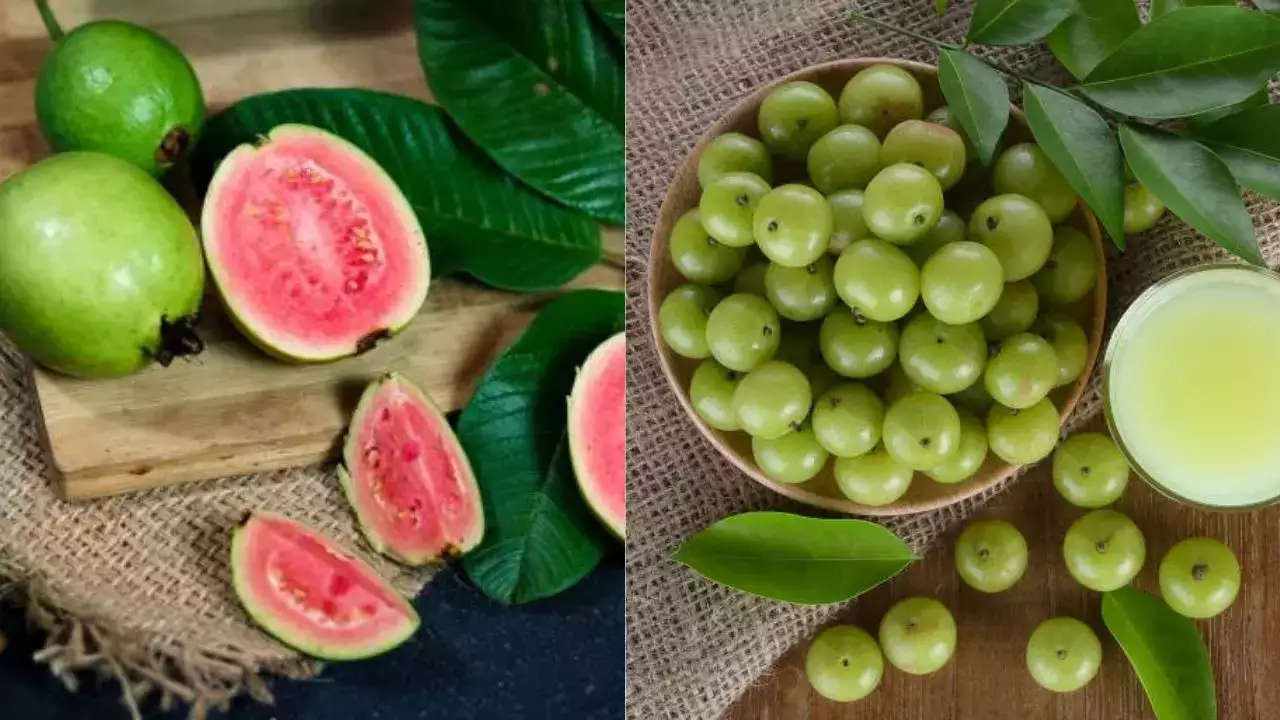
Found in abundance in many fruits and vegetables, vitamin C is packed naturally in both guava and amla – winter delights that are easily available in the market
Vitamin C is an extremely important nutrient for your health, which helps strengthen your bones and joints along with your immune system. Found in abundance in many fruits and vegetables, vitamin C is packed naturally in both guava and amla—winter delights that are easily available in the market.
Also known as ascorbic acid, vitamin C is water-soluble, and your body does not store it. And so, you need to maintain adequate levels of this macronutrient through a good diet.
Guava and amla have both been part of traditional remedies in the ancient Indian diet for centuries. Packed with various other nourishing nutrients, eating an amla or guava daily can do wonders for your health. But if you had to choose one, which would be the healthier option? Here are the differences between these two fruits: their nutritional value and effects on the body.
Guava and its health benefits
Vitamin C plays an important role in maintaining a healthy immune system and since the mineral is packed in guava, the fruit helps reduce a cold’s duration, especially in children. According to experts, it is also linked to antimicrobial benefits – which means guava kills off bad bacteria and viruses that cause infections.
The antioxidants and vitamin C in guava help keep your blood sugar levels down. The fruit also boosts your heart health as it helps protect your heart from damage by free radicals. The higher levels of potassium and soluble fibre in guavas also contribute immensely to low cholesterol and blood pressure levels.
Additionally, guava leaf extract is instrumental in raising good HDL cholesterol.
Being low in calories, guava is also a weight-loss-friendly food. With only 37 calories in one fruit and 12 per cent of your recommended daily fibre intake, guavas are a filling, low-calorie snack that can be eaten at any time of the day. Unlike some other low-calorie fruits, since guavas are packed with vitamins, you won’t be missing out on important nutrients.
Vitamin C antioxidants in guava have an anticancer effect as its magical leaves prevent and even stop the growth of cancer cells. According to experts, it happens due to high levels of powerful antioxidants that prevent free radicals from damaging cells—one of the main causes of cancer. According to a study, guava leaf oil is four times more effective at stopping cancer cell growth than certain cancer drugs.
Amla and its health benefits
Like guava, amla is also another great health booster when it comes to vitamin C. Studies say, amla is one of the richest sources of the antioxidant - packing at least 600–700 mg of vitamin C into each fruit. In addition to protecting the cells against oxidative stress, vitamin C can enhance immune cell function. Vitamin C also helps prevent certain types of infections and shorten the duration of common colds.
High vitamin C content in amla heals and prevents painful stomach ulcers. According to experts, the tangy fruit is also instrumental in regulating your digestion and boosts gut health, thereby boosting metabolism and weight loss.
How much vitamin C do guava and amla have?
Experts say a single guava can provide over 200 per cent of your daily vitamin C requirement, while it is also loaded with potassium, which helps maintain a healthy heart. Amla, on the other hand, is a vitamin C too, as 100 grams of the fruit gives you 600-700 mg of vitamin C.
In addition, amla contains iron, calcium, and powerful antioxidants like tannins and flavonoids, which are great for detoxifying your body. Both fruits excel in vitamin C content, but amla slightly edges out guava due to its higher antioxidant levels.
Get Latest News Live on Times Now along with Breaking News and Top Headlines from Diet, Health and around the world.
